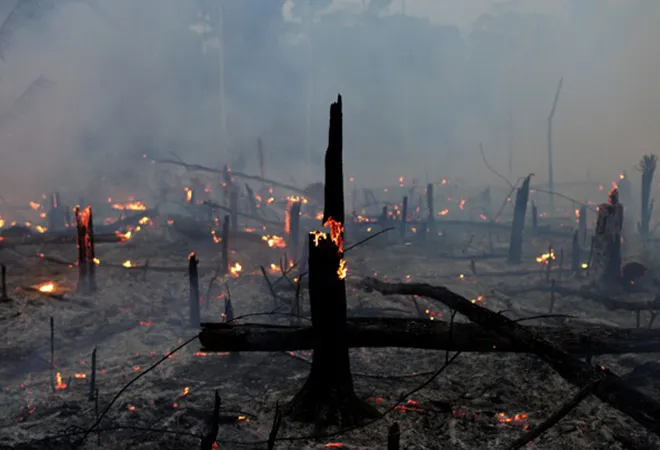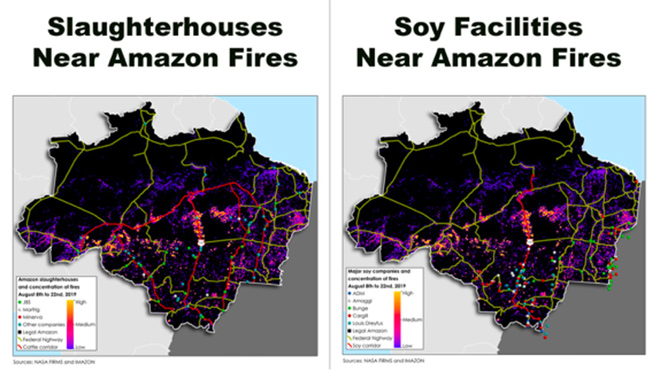
The unprecedented number of fires in the Amazon forest has become a cause of international importance. There has been an 80% jump in the number of fires recorded, with the number reaching a whopping 80,000 fires in Brazil which covers 60% of the totality of the Amazon. Brazil’s far-right leader Jair Bolsanaro has come under fire for his denial of the crisis and refusing aid from Western countries.
Since, Bolsanaro’s accession to power, his government has systematically reduced socio-economic regulations that are imperative to protect the Amazon. Under his regime, there has been a 54% increase in deforestation with Brazil’s top officials directly benefitting from it.
The fires are intentional
Data from Brazil’s National Institute for Space Research (INPE) shows that there has been a steep increment in the number of fires since Bolsanaro’s election. The fact that needs to be understood is that while fires are a natural part of a forest’s annual cycles, fires are not natural to the Amazon’s habitat due to high precipitation and humidity.
For centuries landowners in Brazil have been practising slash and burn agriculture but because of the high density of the forests, it hardly affects their ecosystem. But under Bolsanaro’s leadership, this deforestation has taken a sinister turn.
In one of the report released by Monitoring of the Andean Amazon Project (MAAP) revealed that at least 40,825 hectares of forests (comparable to 56,000 football fields) were intentionally deforested and then set ablaze. In the years 2004-2012, the Brazilian government has been successful in curbing deforestation by 80%. The question then arises, why is the present government not doing the same?
The present government’s ultra-right perspective is that the Amazon forest is their own territory to use and exploit. A thriving, untouched forest does not benefit them at all. Bolsanaro had promised to open up the Amazon forest to the world and that is what he is doing. JBS, one of the most corrupt companies operating in Brazil is credited for these fires as JBS is the world’s largest meat company which is rampantly clearing land for cattle grazing. This is visible through maps where one can see slaughter-houses popping up near deforested lands. Soy cultivation by Cargill has also led to significant deforestation in Brazil.

Bolsanaro has also waged a war against institutions that hold the government accountable like the removal of the head of Coaf, the federal agency that monitors suspicious financial transactions which also acts as the first responders for Brazil’s corruption investigation. He also fired the head of INPE over an argument about satellite data showing a rise in Amazon deforestation, which he calls ‘lies’.
These big companies’ utilisation of the deforested lands is what the Brazil government essentially aimed for. Bolsanaro when asked to comment on the fires, claimed that it was because of the NGOs that the fire took off, however providing no evidence for his claim, giving the world an insight as to how Bolsonaro views these organisations with grievous contempt.
International pressure
Giving an international status to the forests are perceived as a threat by Brazil’s government and a deterrent to their nationalistic capitalist policies which has a bias towards commercialisation over conservation. Bolsanaro’s election has resulted in a diabolical shift towards climate change denial and far-right policies that value commercialisation over conservation. The fierce protection of their nationalistic sentiments is demonstrated in the way that Bolsanaro declined G7’s $20 million aid demanding that French President Emmanuel Macron “withdraw his insults” and further insulted Macron’s wife as well. This is unprecedented as the severe lack of diplomatic courtesy may in turn be harmful for Brazil.
The Amazon Fund, which is dedicated to protecting the Amazon forests and largely funds research and law enforcement, might be threatened. It is mostly funded by Norway and Germany who are now threatening to cut funding because of Bolsanaro’s environmentally regressive policies. Ultimately, Brazil was forced to accept $ 12 million in aid from the UK.
The tragedy of the global commons
UN Secretary-General Antonio Guterres has called for immediate action to stop the fires. How can international action be taken on the matter without intervening in the state’s internal matters and state sovereignty?
The answer might be through international cooperation and international protective measures. The Amazon forest houses 10% of the world’s species and absorbs tonnes of carbon dioxide in a year which could justify intervention based on it being global commons. Global commons are those resources which are shared by multiple countries and a place where common-pool resources can be found like Antarctica. Justifying the Amazon as global commons could be just the thing that climate activists suggest using to intervene in Brazil’s management of the fires.
The question here arises is that can intervention based on environmental action be justified as an obligation? To its credit, humanitarian intervention is not an uncontroversial method but it can be manipulated to militarily intervene in a state’s affairs for less than humanitarian grounds.
The International Commission on Intervention and State Sovereignty in 2001, provided a framework for environmental intervention. Theorising that when a state cannot protect its environment, it is a matter of global concern and the international community must intervene, not through military deployments but through trade sanctions and economic boycotts. Macron can be given credit here for threatening to end trade deals with South American countries unless Bolsanaro decides to stop the burning, recognising its importance as a global concern.
Protection of the Amazon will also have to come at the cost of providing Brazil with alternate sources of income and placement of systems that identifies and rewards the region’s compliance with the forest codes that protect the forests. Funding needs to be improved and an intense compliance mechanism for the UN’s Forests Program that rewards sustainable practices, needs to be established. Drawing a line between curtailing state sovereignty and protecting global commons needs to be established. The repercussions of what happens in Brazil’s Amazon extends well beyond its borders.
The views expressed above belong to the author(s). ORF research and analyses now available on Telegram! Click here to access our curated content — blogs, longforms and interviews.





 PREV
PREV

